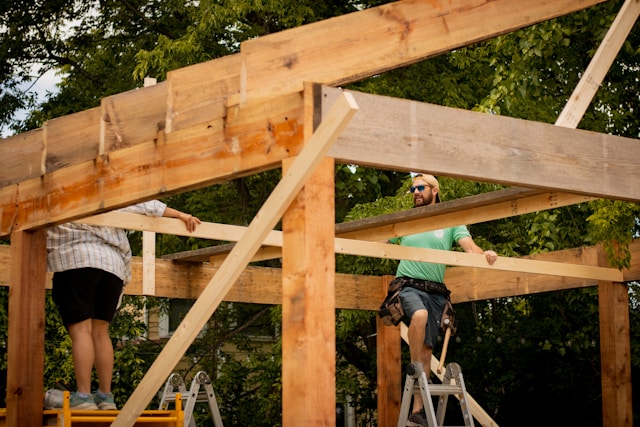What to Expect From a Design Build General Contractor
Working with a design-build general contractor Texas firm means gaining access to an extensive team including architects, engineers, project managers, estimators, and procurement specialists—all under one contract. You’ll benefit from streamlined communication through regular meetings, digital platforms, and dedicated project management. Though Texas doesn’t require state licensing, you must verify they carry proper insurance and permits. The estimation process evolves from conceptual budgets to detailed line-item breakdowns with contingencies. After completion, expect warranty documentation, maintenance inspections, and responsive support.To see how these principles are applied in practice, take a look at how Future Generation Construction.

Roles included in a design-build offering
When working with a design-build general contractor, you’ll encounter a full-service team integrated under one contract. This consolidated approach eliminates the traditional gaps between design and construction phases.
Your contractor typically includes architects who create the structural vision, engineers who confirm technical feasibility, and project managers who coordinate workflow and timeline adherence. Specialized estimators develop accurate budgets while procurement specialists source materials efficiently.
On-site, you’ll interact with construction superintendents overseeing daily operations, specialty trade contractors handling electrical, plumbing, and HVAC systems, and quality control inspectors confirming compliance with building codes. Some design-build general contractor firms in Texas also provide interior designers who assist with finishes and aesthetics.
This single-source responsibility creates accountability and streamlines communication throughout your project.
Licensing and insurance basics for Texas contractors
Beyond the professional team composition, understanding regulatory requirements is pivotal for project security.
In Texas, general contractors don’t require state-level licensing, but most municipalities mandate permits and registrations for specific construction activities. Your contractor should possess these local authorizations before commencing work.
Insurance requirements are non-negotiable. Verify your contractor carries general liability insurance (minimum $1M per occurrence), workers’ compensation coverage, and professional liability insurance specifically for design services. Request certificates listing you as an additional insured.
Bonding provides additional protection—payment bonds guarantee subcontractors receive compensation, while performance bonds ensure project completion according to specifications. For larger projects, contractors should maintain bonding capacity of at least the project value.
Always confirm credentials are current and adequate for your project’s scope and complexity.
How estimates and budgeting work
The estimation and budgeting process with design-build contractors differs from traditional models. With firms like Merit Contractors, you’ll receive thorough financial planning that integrates both design and construction phases. This unified approach typically yields more accurate projections and fewer change orders.
Initial conceptual estimates establish broad budget parameters based on project scope. Design development estimates refine costs as architectural plans evolve. Value engineering identifies cost-saving alternatives without sacrificing quality. Transparent line-item breakdowns detail material, labor, and subcontractor costs. Contingency allowances account for unforeseen conditions or client-driven changes.
You’ll benefit from having a single point of financial accountability throughout your project. This streamlined budgeting process eliminates the finger-pointing that often occurs between separate design and construction entities, ultimately delivering greater cost certainty.
Communication protocols from concept to completion
Effective communication serves as the cornerstone of successful design-build projects, establishing clear expectations from start to finish. You’ll experience a structured approach with regularly scheduled meetings, typically weekly or biweekly, to review progress and address concerns.
Your contractor will implement digital platforms for document sharing, change orders, and project updates. Expect a designated project manager who serves as your primary point of contact, filtering information between you and specialty teams.
Decision-making timelines will be clearly outlined in your contract, specifying when your input is required to prevent delays. The contractor should provide progress reports documenting completed milestones, upcoming phases, and budget tracking.
This systematic communication protocol guarantees transparency, minimizes misunderstandings, and keeps your project advancing efficiently.
Warranty and post-construction support expectations
Quality design-build contractors provide thorough warranty coverage and post-construction support extending beyond completion. When partnering with firms like Merit Contractors, you’ll receive post-project care designed to protect your investment and guarantee lasting satisfaction.
- Detailed documentation of all warranties, typically ranging from 1-10 years depending on systems and materials
- Scheduled maintenance inspections during the warranty period
- Responsive service teams dedicated to addressing warranty claims within predetermined timeframes
- Digital portals for submitting support requests and tracking resolution progress
- Training for staff on building systems operation and maintenance
This post-construction relationship highlights the design-build advantage—your contractor maintains accountability for both design decisions and construction quality.
Sample questions for clarifying process and fees
Understanding a design-build contractor’s process and fee structure beforehand guarantees clear expectations throughout your project. Ask these specific questions during initial consultations:
- How is your fee calculated—percentage-based or fixed-fee?
- What specific design services are included in your contract?
- Are permit acquisition costs included or billed separately?
- What’s your change order process and associated fees?
- How do you handle material selection and procurement?
- Do you provide detailed milestone payment schedules?
- What contingency percentage do you recommend for this project?
- How are construction delays addressed contractually?
- What documentation will I receive during design development?
- Are there separate fees for project management versus supervision?
These questions help clarify the financial framework and procedural methodology that will govern your design-build relationship.
To better understand the wider construction industry, you may also want to explore this guide on what construction is and why it matters.
